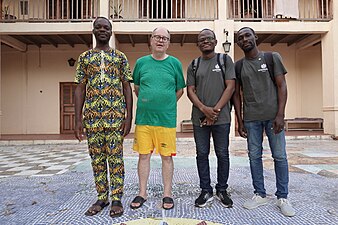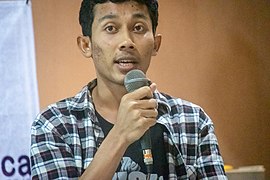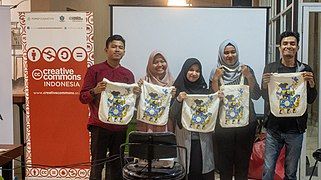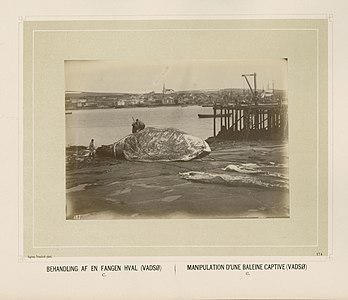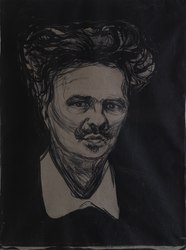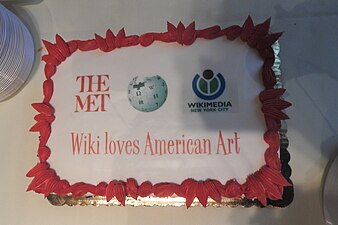GLAM/Newsletter/January 2020/Single
|
Burning

1Lib1Ref State Library Queensland
Another brilliant January #1Lib1Ref campaign from State Library Queensland in 2020.
Jacinta Sutton launched #1Lib1Ref 2020 at an online community meeting, sharing some secrets on the way State Library of Queensland goes about this campaign.
Across the three week campaign running til 5 Feb, 26 State Library editors made 348 edits to 183 Wikipedia articles. Congratulations to Jacinta, Kerry Raymond and those unbeatable editors.
How are bushfires named?
Wikipedians learned more than they wished to about how to name and describe bushfires as the horror summer emergency unfolded in Australia. The 2019-20 Australian bushfire season is still a work in progress. We were approached by Australia’s Blue Shield organisation to help identify GLAM collections that may have been affected based on towns and sites in fire regions. This led to the creation of a list article: List of fires and impacts of the 2019-20 Australian bushfire season.
Wikiviews from Benin: Wikipedia in the Tower of Babel

This was my second visit to Benin, where I visited first time about two years ago. This time I stayed there for two months from October to December 2019.
Benin in West Africa is often called ”a small African country”, even though its population (about 12 million in 2020) is twice the population of Finland. Perhaps the smallness comes from the area that covers about one third of Finland.
I was a stipendiat in Villa Karo, that is the only Finnish cultural center and residence in Africa. It is located in Grand-Popo, a community in South-West coast of Benin that consists of a cluster of villages at the issue and lagoon area of Mono river.
Villa Karo hosted a Wikipedia event in November. The purpose of the event was to inform people living in Grand-Popo rural area about Wikipedia and to urge local people to form editing ring.
The event started with greetings by Fawaz Tairou from the Wikimédiens du Bénin User Group, who had participated the previous weekend the Wiki-Indaba in Abuja, Nigeria. After that I gave a talk on following subjects: what is Wikipedia, and what can Wikipedia do? Finally, there was a discussion of what can I do to Wikipedia?
Wikipedia, the same and so different

If we look at Wikipedia articles in any of the about 300 language Wikipedia editions, they seem formally more or less the same. This is somewhat deceiving, because the conditions to create these articles are not the same in different parts of the world. In order to understand the conditions in Benin, we have to know some facts.
Accessibility to net remains a prevailing problem in Benin. There is good coverage of mobile network, but the data is expensive for those who can afford using it. Average price of one gigabyte (1GB) of mobile data (2019) in Benin is 20,99 US$. It ranks with the most expensive data among African countries with Chad, Zimbabwe and Mozambique. The average price of one gigabyte in Finland is 1,16 $.
The big star of modern communication in Africa is smartphone. It has achieved a great breakthrough since the transistor radio about 50 years ago. Looking from Wikipedia viewpoint, smartphone is great for reading and short editing. But hardly it is a device for serious searching information and writing of articles, in spite of Wikipedia mobile interfaces. Laptops and tablets are rare and accessed mostly by those who need them for work.
In the tower of Babel
If you think of languages of Benin, it is the tower of Babel. In principle, I guess Wikimedia policy would be to support African languages, but how to create Wikipedias in a country where local languages, almost all non-literal, extend to as much as about 50? In Benin area French and Yoruba language Wikipedia are published, and Fon language Wikipedia is in incubation stage.
Culture in Africa is mediated from one generation to another mostly orally. Here Wikipedia verification standards have not much to say. Should we create another citation policy for these languages?
African information resources are scarce. In Benin public library or museum network do not cover especially the smaller communities. I discussed the hot issue of restitution of African art and cultural objects from European museums back to Africa with local experts. I was reminded that there is no national museum in Benin.
Illiteracy, which is still more than 50 percent of the population, is a big problem in Benin. Wikipedia is a media that can help to fight illiteracy. In Benin it is usual that people understand one or two African languages and in addition to French, the Lingua Franca, another European language, too.
On the other hand, I never had difficulties finding my way in Benin. The society is very multilingual and the skills of oral communication are high.
Thirst for knowledge

During my first travel, I visited a secondary school class in Grand-Popo and gave a lecture about Wikipedia in a classroom with only two chalkboards and one map. After the lecture I asked the school students to present any questions from Wikipedia, since I had a laptop with mobile connection with me. Wikipedia gave answers to all their questions in French, which is the language used in schools. The thirst for knowledge seemed to be endless. Is there a list of French kings? Give some details of the planet Pluto. What is the birth year of Michael Jackson?
A Nobel prize study published last year confirm that providing information with developmental aid is essential in fighting poverty. In schools, we must change the Wikipedia usage and writing closer to the students everyday life and their own view rather than abstract structuralism from above.
Those who have permanent access to Internet read Wikipedia. But they seem to know less of how to use Wikipedia and how to edit and write it. It is important to mediate the readers of Wikipedia knowledge about Wikimedia information systems to understand the elements of the whole.
Organizing Wikipedia

Editathons that are used in many countries in introducing Wikipedia, are not perhaps the best way to initial approach here. Understanding the organization and idea of knowledge and structural information, the use of citation and principles of encyclopedic knowledge are perhaps more essential than creating hands-on situations.
I was invited by Wikimédiens du Bénin User Group to University of Benin in Abomey-Calavi to talk about the three photo contests they organized in 2019. I analyzed and gave criticism on participating photographs. Especially popular was Wiki Loves Africa 2019 photo contest, where Benin achieved the second largest number of photos uploaded. Is it adherent to this multilingual society, that visual communication is paramount? If I think of the African culture heritage, no better word comes into my mind than ”audio-visual”. Think of the possibilities of Wikimedia systems with this in the age of smartphones!
One of the ideas brought up in discussion of the Villa Karo event was that the organizers of Wikipedia events should guarantee at least one working computer with network for the participants.
Wikimedia Suomi is planning a new Benin Bilateral Companionship program. Our long-term goal is to share the experience between WMFI and the new Benin Wikimedia movement. We work with culture center Villa Karo in Grand-Popo, Benin and their Helsinki office. I met with the representatives of Villa Karo organization from both Benin and Finland, and they greeted this with interest.
After the Villa Karo event, a local Wikimediens du Grand-Popo group was formed as a WhatsApp group.
-
Villa Karo main building in Grand-Popo, Benin in December 2017.
-
With Wikimédiens du Benin people in front of Villa Karo main building.
-
Wikipedia in Villa Karo event.
-
Schoolkids studying books in Villa Karo library.
-
Villa Karo museum.
-
I caught a Zangbéto performing at Vodun Festival in Grand-Popo, January 2018.
-
Street market view in Come, the nearest city.
-
Zinsou Museum in Ouidah, Benin.
-
Viewers at the monument "Door of no return" in Ouidah.
Paris musées; Bibliothèque Sainte Geneviève
Paris musées
Wikimedia France has signed a partnership with "Paris musées" in the framework of their open content policy which consists in opening more than 100 000 artworks in CC0. The association helps Paris musées in advising about wikimedia projects, their community, the tools, and proposes training courses about Wikimedia projects, Pattypan and OpenRefine.
Bibliothèque Sainte-Geneviève
Work with BSG is in progress with a project of uploading portrait etchings on Wikimedia Commons and covering the restoration of L'Aurore boat model.
1st PD Day in Indonesia; visitation to GLAM institutions
PD Day 2020
For the first time, GLAM Indonesia, with the help of Wikimedia Indonesia and Creative Commons Indonesia, celebrated Public Domain Day 2020 in Indonesia to bring the public attention to the works that have entered public domain this year. Medan City was selected to held the event considering Chairil Anwar, a prominent Indonesian poet, born here in 1922. This year marked his works to be in public domain and also other works of an Indonesian writer, Tan Malaka.
The event participated by more than 25 people from different expertise, from musician, author, university student, and cultural practitioner. Some performance were done, including reciting poem and adapting several Chairil Anwar's poems.
Along the celebration, there were Wikisource and GLAM+Wikidata workshops held before and after the celebration.
See the pictures below:
-
Group work to adapting several Chairil Anwar's poems
-
Poem recitation
-
Awarding prizes for best group performance
-
Group photo after PD Day 2020 celebration
-
Event highlight (video)
-
Group photo of Wikisource workshop
-
Group photo of GLAM+Wikidata workshop
Museum and library visits
Site visits were done to several GLAM institutions in the beginning of 2020 to talk about the ongoing activities and to follow up proposed collaboration.
Ajip Rosidi Library and Library of Kirtigriya Museum are the institutions Wikimedia Indonesia is currently working with. Meanwhile, Indonesia Museum of Taman Mini Indonesia Indah, Deli Serdang Museum, and STAIS Al-Ishlahiyah are some institutions we have been proposing the collaboration. We are trying our best to make the cooperation between these institutions happen this year.
-
Deli Serdang Museum main entrance
-
Introduction to the museum by their staff
-
Looking at one of Indonesia Museum of "Beautiful Indonesia" Miniature Park's museum objects
A brand new and old faithful Wikimedian in Residence!
Accademia delle Scienze on board!

Wikimedia Italia and the historic Accademia delle Scienze di Torino kicked off their brand new collaboration! Marco Chemello was appointed as a Wikimedian in Residence and will collaborate with the institution until June 2020. Edith-a-thons, backstage tours and great contents to come!

BEIC and WMI go on!
BEIC (Biblioteca europea di informazione e cultura in Milan) and Wikimedia Italia confirm their seven-year-old collaboration that already brought more than 20.000 quality images and 1.000 books to Wikimedia projects.
Macrons and museums
The great macron debate

New Zealand English uses quite a few words borrowed from Māori, a language which has both short and long vowels, the latter indicated by a macron accent: ā. These don't just change the pronunciation, they change the meaning of the word: so Sir Peter Jackson's digital effects studio Weta Workshop should actually be spelled "Wētā Workshop", because currently the name translates as "Excrement Workshop".
For many years, NZ English simply ignored long vowels because macrons were too difficult to type (in the '90s people experimented briefly with umlauts, but "Mäori" just looked too peculiar). Since about 2015, though, with better technology, most reliable sources in NZ have switched to macrons: television, newspapers, education, most book publishers, most major magazines, and all government departments. Wikipedia has generally used macrons for words of Māori origin in articles in NZ English, with one exceptions: place names, which don't use macrons, a decision which has supposedly been "under discussion" since 2007.
In 2018 a long debate broke out on the Wikiproject NZ Talk page over retitling an article "Paekākāriki"; much heat but little consensus ensued, and those favouring the status quo pointed out this was the wrong forum for the debate anyway. A couple of weeks ago User:Schwede66 put together a thoroughly-researched RFC and proposed an update to the Naming conventions (New Zealand) to allow macrons in place names, based on the official names in the New Zealand Geographic Board's official gazetteer. Comments are currently running 34 to 4 in favour. If the change is approved, this will affect hundreds of article titles, and thousands of instances of usage.
What's notable about the discussion is the media coverage. In 2018 one newspaper noticed the great macron debate and ran a short piece; in 2020 there has been radio, magazine, and newspaper coverage (even by the UK Guardian), all generally giving a good account of the intricacies of Wikipedia decisionmaking. This is the sort of public discussion of Wikipedia we'd never have seen in New Zealand just a few years ago.
Wikipedians take top roles at the national museum

Victoria Leachman (User:Einebillion) is one of the organisers of Wellington's fortnightly Wikimedia meetups. She has also for some years been Digital Rights Manager at Museum of New Zealand Te Papa Tongarewa, and has been in the forefront of discussion of GLAM copyright issues. In January she was promoted to Head of Collections Access, which bodes well for Te Papa's future collaboration with Wikimedia projects.
Te Papa's new Chief Executive is Courtney Johnston, who came from a career in digital heritage and director of the Dowse Art Museum to be Te Papa's Director Audience and Insight, before being appointed the youngest-ever head of the institution in January. Courtney is also a Wikipedian (User:Auchmill), who in 2015 organised the New Zealand Craft Artists project, the first GLAM-Wiki residency at a New Zealand institution. Two students spent a summer creating 100 articles about New Zealand craft artists, well described at the Dowse's website. It's great to see senior museum positions like these occupied by people with hands-on Wikimedia experience; watch this space.
Sámi cultural heritage
Sharing image collection on Sámi cultural heritage
One project Wikimedia Norge did during The International Year of Indigenous Languages 2019 was to upload a Sámi image collection from The Norwegian Museum of Cultural History to Wikimedia Commons. The project was done with funding from The Norwegian UNESCO commission in Norway to Wikimedia Norge.
All of the uploaded pictures are located in this category on Commons – help with categorizing the images further is much appreciated! The upload is still in progress due to some technical difficulties – about half of the 3,000 images have been uploaded as of writing this.
The Sámi National Day, February 6

Lihkku Beivviin! The Sámi National Day is celebrated February 6. Wikimedia Norge celebrated too, and if you like one of these nice and yellow gym bags, send us an email (wikimedia@wikimedia.no) with your name and post address, and we'll send you one!
FindingGLAMs Challenge; Art by Edvard Munch from the Thiel Gallery; More European archives on Wikidata; OpenGLAM now! – watch the presentations; Wikipedia in Libraries
FindingGLAMs Challenge

February 17th – 23rd everyone can participate in the FindingGLAMs Challenge – a competition to improve data about GLAMs on Wikidata. The rules are simple – join the Challenge Dashboard and start adding information to Wikidata items of museums, galleries, archives and libraries – or creating new ones. The most active participants will receive prizes from Wikimedia Sverige.
The competition is a culmination of the over a year long project FindingGLAMs in which Wikimedia Sverige, in partnership with the Wikimedia Foundation and UNESCO, has been working at improving data about cultural heritage institutions and their collections across the Wikimedia Projects.
Art by Edvard Munch from the Thiel Gallery
The Thiel Gallery in Stockholm have uploaded 106 images by Edvard Munch as part of a digitization project and in time for the opening of a Munch exhibition. Future uploads will include sculptures and more paintings from their collections, and will be shown at their project page.
-
Strindberg
-
On the bridge
-
The kiss
-
The oak
More European archives on Wikidata

Archives Portal Europe provides information about archival materials in the collections of several thousand European institutions, as well as the archives themselves. Wikimedia Sverige has worked with APE to import their institution directory to Wikidata. A key element of the collaboration was releasing the directory under a CC0 license. Now Wikidata has a new property, P7764, which has been used almost 7,000 times – mostly in items that were created from scratch using data provided by the Archives Portal Europe. That's a lot of items to edit and improve in the FindingGLAMs Challenge!
You can read more about the collaboration in our report.
OpenGLAM now! – watch the presentations
Open GLAM now! is a webinar series that the Swedish National Heritage Board produced in 2019, exploring how museums and other cultural heritage institutions can use digital data and media to work with their audiences. All the presentations are now up on Youtube. Some are in Swedish and some in English. The topics include copyright and licensing, hacking cultural heritage, collaboration between institutions and user-generated content.
Wikipedia in Libraries

The project Wikipedia in Libraries is on tour and we are doing workshops in five locations around Sweden. We have completed the first part with visits to Umeå, Stockholm, Gothenburg, Örebro and Hässleholm. It is now a two-week break before the next round of meetings. We have met about a hundred librarians and been talking about free knowledge and how we can use Wikimedia's platforms in such a way as to fit into the library's program activities.
The homework until the next meeting is to conduct a workshop for some in-house staff, discussing what themes might be possible and interesting from a local perspective and what such an arrangement might look like. We are using the Outreach Dashboard as a tool to track the development of the platforms. At the next meeting, we will talk more about images in Wikimedia Commons and about structured data in Wikidata. The librarians are well aware of different systems for categorization and the usefulness of adding linked open data.
Wikidata for Libraries Hackday Series
In the second half of 2019, a Wikidata for Libraries Hackday Series was carried out in Bern and Zürich, with the participation of staff members of the Swiss National Library, the Zürich Central Library, the ETH Library as well as OpenGLAM CH.
For the participating libraries, the goal of the hackday series was to explore ways in which they could engage with Wikidata - both by contributing data, and by using it to enhance their own service offerings. Participants were expected to contribute around 150 hours each over a six-months period. In small groups of up to 5 people they worked on four different projects, three out of which were successful and are described in more detail below. A fourth one, aiming at mapping a correspondence network on Wikidata, was abandoned due to insufficient data.
Graph-based Query Expansion on Library Discovery System

A first project focused on enhancing the search experience on library discovery systems by drawing on Wikidata and the GND.
The ETH Library uses ExLibris Primo as its discovery system search portal through which users can search and access the library's resources and materials. The common way to carry out a search is to enter a search term, upon which a list of search results is returned. The result list can then be further filtered by facets. This approach has however a major shortcoming: It is based on a search for strings and not on a search for the actual things. Thus, the system does not allow searches for entries on specific places or persons, leaving it to the user to skim through the search results in order to separate the useful from the useless. At the same time, the demand from the Digital Humanities for more precise search possibilities has been increasing over the past years, and investments in respective digital infrastructures have been made.
This is where Wikidata comes in handy, as its graph allows more diverse information combinations than the discovery system. The Wikidata Hackday series was therefore used to explore ways to expand the Primo discovery system by drawing on Wikidata. From a technical point of view, Primo offers the possibility to add functions via AngularJS programming. The code of the prototype has been made available at Gitlab. A Documentation is also available there.
Improving the research possibilities in Primo by allowing for searches for precise persons and places leads to two advantages:
- The library can better link to and from other sites, such as the Historical Dictionary of Switzerland, Histhub / Metagrid, Wikidata, and others, by providing permalinks to places and persons that refer to the library's resources in a suitable form. – For example: To provide a link to search results for the municipality "Rothenburg (Switzerland)", external services can include the Wikidata Q-number "Q7083" in the search query; this will spare users the effort of sifting through results pertaining to other places named "Rothenburg".
- Users are provided with additional research possibilities, allowing to filter or expand search results around specific persons or places. – So far, the new functionality has been deployed on a test system; deployment on the productive system is expected over the coming months.
Referencing Archival Fonds on Wikidata

A second project focused on referencing archival fonds on Wikidata, so that the respective information would be available as linked open data and could easily be retrieved by third party services, such as library discovery systems or archival platforms offering searches across organizations.
Referencing archival fonds regarding persons on Wikidata is straightforward: it suffices to interlink the Wikidata item of a person with the Wikidata item of the respective heritage institution by means of the property "archives at" (P485). A qualifier "inventory number" (P217) is used to indicate the inventory number, and a "reference URL" (P854) to provide a link to the respective entry in the online catalogue (see e.g. Leopold Ružička (Q122996) for an illustration).
The participating institutions each ingested several hundred references to archival fonds about persons. In many cases, new person items had to be created based on the data available at the institution. This was done for all the persons for which the first name, surname, year of birth and year of death (if applicable) was known. In the case of incomplete data, the data ingest was postponed until further research would yield the necessary information.
The project team initially also looked into referencing archival fonds about organizations, but quickly realized that it would run into difficulties related to the heterogeneity of approaches when it comes to representing organizational changes over time in the source systems (name changes, mergers, acquisitions, etc.). This is an issue that needs to be tackled in the context of another project.
The project team is delighted to see that some Wikipedias already automatically transclude the information about the archival holdings in their person infoboxes (e.g. French or Catalan Wikipedia), giving the newly added data immediate visibility. The infobox templates could now be extended to also provide the direct links to the respective entries in the archival catalogues. Further outreach efforts are needed to convince other Wikipedia communities to automatically add pointers to relevant archival holdings from their Wikipedia articles (through infobox templates or by other means).
If you are interested in referencing your archival fonds on Wikidata as well, please find our step-by-step documentation on our procedure here: How to Link Your Institution’s Collections to Wikidata? https://doi.org/10.3929/ethz-b-000393724
Sum of All Swiss GLAMs

The third project tackled the implementation of the Sum of All GLAMs project in Switzerland. The goal of this project is to add data about all heritage institutions on Wikidata and to make this data available on Wikipedia through infoboxes. Keeping the data for all Wikipedias in one central location on Wikidata will ease the burden related to data maintenance in the future (both for Wikipedia communities and data providers). Including the data in Wikipedia infoboxes will enhance the data's visibility and thus draw people's attention to possible errors and incomplete data.
The hackday team's activities comprised the following:
- evaluating the completeness of the data for Switzerland;
- tackling data modelling issues and cleaning up data on Wikidata;
- evaluating the possibility of ingesting data about library branches from the Swiss National Library's database of heritage institutions (IS Plus); and
- engaging with colleagues at the Wiki Movement Brazil and various Wikipedia communities in view of the creation of infobox templates transcluding data from Wikidata (see example).
By doing so, it prepared the terrain in view of a pilot project to be launched in 2020, by means of which we are planning to invite Swiss heritage institutions to check, correct and complement their data entries on Wikidata. The case report of the Sum of all Swiss GLAMs project is available online.
Outlook
In 2020, the three projects will be further pursued and promoted among Swiss heritage institutions and at various conferences. We found that the three approaches are complementary and reinforce each other and will promote them as part of a larger linked open data strategy. We would be happy to see them propagate to other countries and are looking forward to hearing from you if we have awakened your interest.
Knowledge Graphs and Meetups
Metropolitan Museum of Art's Understanding America Edit-a-thon
The Metropolitan Museum of Art, with support of Wikimedia NYC, held the Understanding America Edit-a-thon. Among the activities included improving the articles around Americana and visualizing the collections of The Met with new tools. Andrew Lih (User:Fuzheado) showed the early test of a new tool to assist in creating knowledge graphs in Wikidata, called Knowledge Grapher. You can try out the tool here on ToolsLabs.
Knowledege Grapher takes a list of Wikidata items or Wikipedia articles and finds the relationships among the Wikidata items related to the list. It then uses Wikidata's graph display to show connectedness among those concepts and Wikidata items. Some examples from the Edit-a-thon include illustrating Hudson River School artists and their paintings, or depiction info related to those paintings. Browse some of them below or create your own.
Met's Hudson River School aritsts and works in the collection of the museum.

Illustration of all depictions in Hudson River School works and themes

Users are welcome to try the tool and feedback is appreciated.
Editing highlights from the edit-a-thon include an expansion of Hiawatha and Minnehaha, a pair of busts by the African American and Native American sculptor Edmonia Lewis, and translations of two major Hudson River School paintings to French Wikipedia.
Women's Suffrage Centennial Wikipedia Editing Workshop
Arlington public library, and Wikimedia DC held a meetup, Women's Suffrage Centennial Wikipedia Editing Workshop
Frankie Knuckles and Friends
Stony Island Arts Bank and AfroCROWD held a meetup, Frankie Knuckles and Friends: A Wikipedia Editathon
Wikipedia Day San Diego
San Diego Central Library and San Diego Wikimedians held a meetup, Wikipedia Day edit-a-thon
Public Domain Day
American University Washington College of Law, Creative Commons, SPARC, and Internet archive held a meetup, Public Domain Day: A Celebration of Our Shared Culture and Heritage. Brewster Kahle and Julia Reda talked; there was a livestream.
American Folklife Center’s Wikipedia Edit-a-Thon
The Library of Congress American Folklife Center, and Wikimedia DC held a meetup, American Folklife Center’s Wikipedia Edit-A-Thon: Biographical Entries on Women Folklorists, Ethnomusicologists, and Fieldworkers
SPIE Photonics West edit-a-thon
The annual SPIE (previously known as: Society of Photographic Instrumentation Engineers) Photonics West conference held a Wikipedia workshop at the Park Central Hotel in San Francisco. It focused on equity, diversity, and inclusion in researching, writing, and improving the biographies of gender, ethnic, and racial minorities working in photonics and optics. Attendees also became acquainted with how to upload photos to Wikimedia Commons. It was hosted by SPIE Women In Optics, and the instructor was Rosie Stephenson-Goodknight.
One Year Anniversary of Cleveland Museum of Art's Open Access
January 23, 2020 was the one-year anniversary of the the Cleveland Museum of Art's Open Access Program, which has released images of 30,000 public domain artworks into the public domain, alongside metadata for more than 61,000 artworks. In recognition of the one-year anniversary of this program, WikiProject Cleveland of Art launched an online editing campaign to create and improve articles related to the Museum, including artists and artworks featured in its collection.
Some statistics on Wikimedia since the start of the program:
- There are over 62,000 Wikidata items with Cleveland Museum of Art (CMA) accession numbers.
- The 80 millionth Wikidata item, Q80000000, represents a medal from the CMA's collection commemorating the 300th anniversary of the purchase of Manhattan Island.
- There are over 40,000 images of CMA artworks on the Wikimedia Commons, representing 28,170 unique artworks.
- CMA scans and photographs have been used to illustrate Wikipedia articles in over 25 languages.
- Turner's The Burning of the Houses of Parliament alone is used in 27 articles in 16 different language editions of Wikipedia.
New Book
New Book: Creative Commons for Educators and Librarians

Creative Commons have published a new book: "Creative Commons for Educators and Librarians" (which is openly available under a CC by licence!). A number of other formats are freely available, and hard copies can be purchased.
February's GLAM events
| <<< previous month | February 2020 | next month >>> | ||||
|---|---|---|---|---|---|---|
| Monday | Tuesday | Wednesday | Thursday | Friday | Saturday | Sunday |
| 27 |
28 |
29 |
30 |
31 |
1 |
2 |
| 3 |
4 |
5 |
6 |
7 |
8 |
9 |
| 10 |
11 |
12 |
13 |
14 |
15 |
16 |
| 17 |
18 |
19 |
20 |
21 |
22 |
23 |
| 24 |
25 |
26 | 27 |
28 |
29 |
1 |



